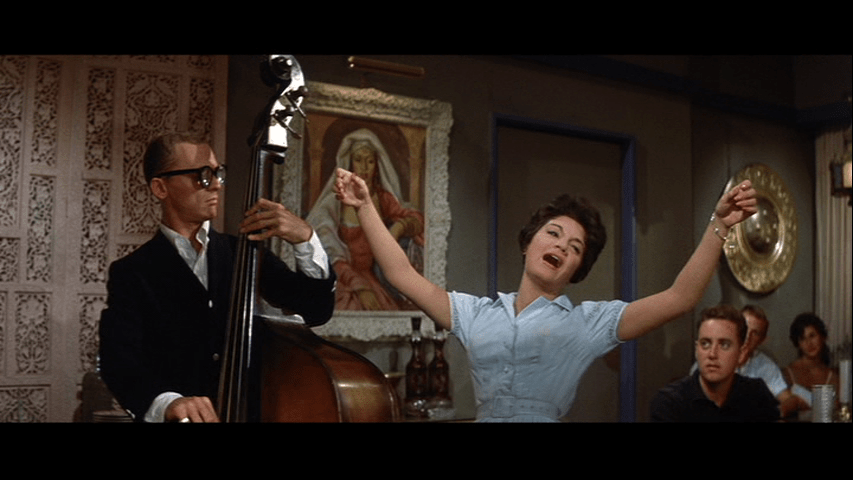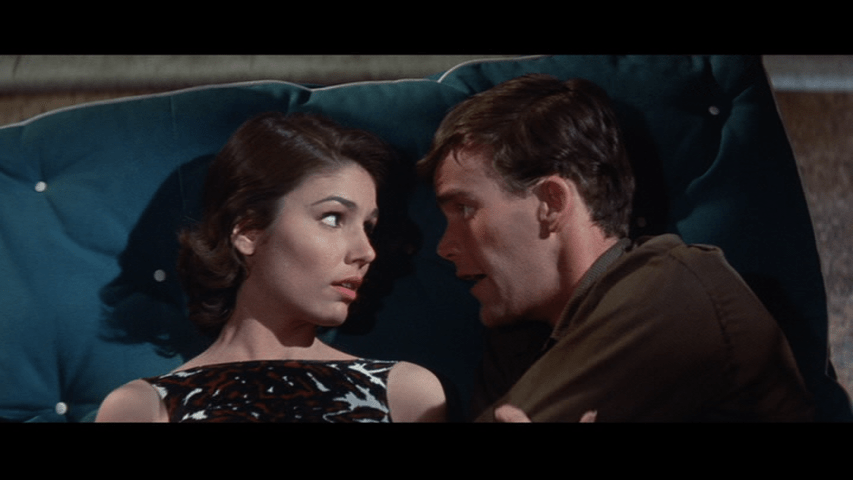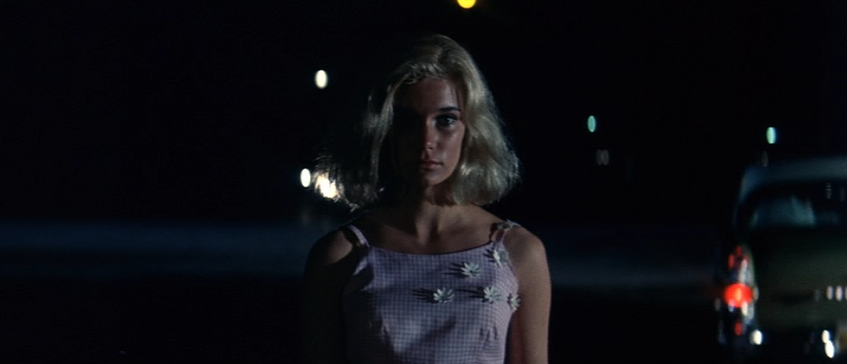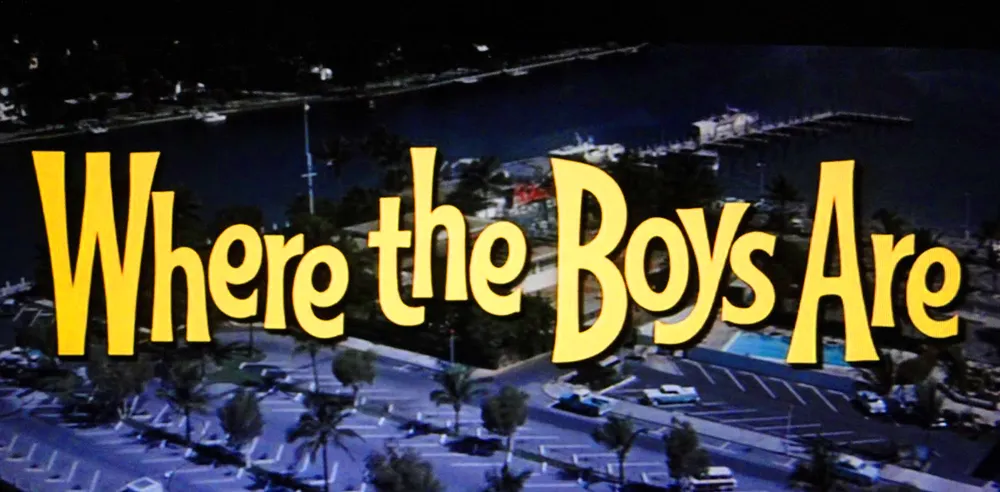A few years ago a friend and I were watching some classic movies and we decided to put Where the Boys Are in the DVD player. I tried to warn her that this movie is pretty weird, but even my warnings didn’t prepare her for a movie she later told me might be one the weirdest movies she’d ever seen – and she had just shown me Dark Crystal. Where the Boys Are is a classic, lush MGM movie from Producer Joe Pasternak (a fascinating Hollywood figure), but it’s also a sex comedy about college co-eds heading to Fort Lauderdale for spring break, focusing on the sexual concerns and drives of women.

The women of Where the Boys Are are smart, opinionated, and funny 19- and 20-year-olds from an all-girls college. The cast of characters include Tuggle (pretty sure that’s a nickname), played by Paula Prentiss; Angie, played by Connie Francis (both actresses making their film debut); Melanie, played by Yvette Mimieux (Hollywood’s eternal ingénue); and leader of the pack Merritt, played by former Elvis girlfriend and future nun Dolores Hart. Merritt is arguably the smartest of the girls, and certainly most focused on her education, but she’s reached a level of frustration with the expectation that girls shouldn’t talk about sex… especially the open lie that girls shouldn’t enjoy sex, and the idea that wanting it outside of marriage makes them immoral. Maybe a fever propels her to speak up, but really she seems frustrated by the outdated lessons given to girls in a class called “Courtship and Marriage” (seriously, they have to take that class).
The interesting thing about Merritt’s storyline, and why this movie is such a fascinating pre-second wave feminist artifact, is that Merritt isn’t saying she wants to have sex, or passing judgement on girls who do or do not “put out a little.” What she wants is the right (and a pretty basic right at that) to have a conversation about sex without fear of judgement being passed by superiors, peers, or men. While her teacher dismisses her opinions and sends her to the dean to be disciplined, Merritt does have a tight enough group of friends with whom to talk about sex and men without fearing for her reputation. And during their trip to Fort Lauderdale for spring break, she uses the opportunity as one of many strangers to test her ideas about sex before marriage with Brown senior Ryder Smith (I love the names in this) played by pre-super tan George Hamilton.

If Merritt is uncertain of her ideas about sex and marriage, Tuggle is absolutely sure of herself. She wants to lose her virginity to her husband and be a stay at home wife and mother. A smart, articulate girl, Tuggle tells her friends with some delight, “Girls like me weren’t built to be educated. We were made to have children. That’s my ambition: to be a walking, talking baby factory. Legal, of course. And with union labor.” While I’m baffled by a college girl like Tuggle speaking so dismissively about education, there is something fascinatingly complex about her views of marriage as a choice, rather than a foregone conclusion, and her stick-to-her-guns views of sex and marriage, without ever ridiculing other girls deciding to engaging in sex outside marriage or not planning for marriage and family. In 1960, that view of society as something larger that your own personal worldview, and not attempting to force those views on others, was somewhat revolutionary.
Tuggle won’t be pushed around, either, as we see in her relationship with charming goofball TV Thompson (Jim Hutton). TV came to Fort Lauderdale with the express mission of having sex, but meets and falls for a girl who wants to save herself for marriage. At times he is fine with the idea, wanting to be with her regardless of the possibilities of sex; but at other times, TV puts the pressure on, until he ditches Tuggle for a sure thing. So is he an oversexed kid or a predatory jerk? Probably a little of both. But the reason I legitimately love Tuggle’s character is that she sticks to her moral compass, even if it means losing her guy; the first guy with feet bigger than her own.
Although Hutton and Hamilton are both sexed up and too eager to be with the girls, they are nothing compared to the love interests “assigned” to Angie and Melanie. Angie is arguably the most problematic character in this movie: she is the definition of self-deprecating, but the elements of her personality which she considers unsexy play into negative stereotypes about femininity. For example, Angie jokes to Melanie that her parents aren’t concerned for her well-being around men because she’s the captain of the field hockey team, playing into the idea that athletic girls aren’t attractive. She certainly likes boys and wants a boyfriend, to the point that she’ll go out with self-involved dud in the form of Frank Gorshin (the Riddler of Batman fame) who has no interest in her and only thinks she’s pretty when he loses his glasses, which delights Angie because she’s so “unattractive” despite being played by the very cute and funny Connie Francis.
The issue I have with this, even more than suggesting Connie Francis was some kind of troll, is the fact that she has such a low opinion of herself and is so desperate to find of boyfriend – especially compared to her friends, like Merritt, who isn’t desperate or hunting for men. Angie seems to have no confidence, and once Groshin’s Basil arrives as a man nerdy and unaware enough to like her, she becomes laser focused, never thinking he might not be worth the effort. Angie wants to “trick” a man into marriage, and reinforces the “best friend” as something unlovable and unattractive, something we saw in last year’s The Duff.

Melanie is saddled with the most complex storyline because, while everyone else gets to be funny and natural in their courtships, she’s the girl who loses herself in a desperate attempt find a boy. The movie stresses that she doesn’t have much experience with boys, and even a class like Courtship and Marriage isn’t giving practical life advice. Melanie’s focus is getting the boys with whom she has only one week to like her, and she give herself over to men who say they love her. Even Merritt sees the danger to Melanie’s psyche and well-being in jumping into bed with any guy who claims to love her – because some of them don’t mean it. But Merritt isn’t judgmental of Melanie for losing her virginity of sleeping with two guys, though she is genuinely concerned, and boy is it refreshing to see some sincere female friendships on screen where the girls don’t get catty or competitive about men.
The odd thing, and reason I think my friend decided this was the weirdest movie she’d ever seen, is this movie does have a story which explicitly features date rape – fifteen years before the term was coined. There is no doubt that what happens to Melanie is wrong, illegal, and not her fault, despite feeling so overwhelmed that she attempts to walk into traffic and kill herself. I like the fact that Tuggle reports the crime, talks about it as a violent crime, and wants to punish the man responsible, never suggesting Melanie is at fauly for leading men on or being “loose.” And while I’ve heard people say the rape is some attempt to moralize or punish the girl who has sex, there is a clear difference drawn between consensual and forced sex. As cruel as it might seem, Melanie’s weakness was not her sex drive, but the lack of common sense forced on “good girls” by society. She is not guilty or deserving of her fate, even if a girl with a bit more experience may have seen the danger signs earlier, as do Merritt and Tuggle.

In the 1960s, Where the Boys Are was a seminal movie for the baby-boomer generation. Before the summers of free love, whispers that sex was something more than a marital obligation and should be enjoyed was an open secret – and the female sexual urge was finally being addressed. The book was written in 1959 (and is even weirder that the movie because of a weird Cuba subplot), but the film’s emphasis on dialogue, and the private conversations between girls, makes it a genuinely interesting flick. It was a pretty successful at the box-office, and started the careers of Connie Francis, Paula Prentiss, and Jim Hutton; and it lead to a new kind of movie, the teen beach film, such as Gidget and Beach Blanket Bingo. It also helped to jumpstart Florida’s Spring Break industry, where we’d eventually see considerably worse behavior, captured in a remake of sort in 1984, a movie which expresses the ideas of the macho men, a real T&A view of women of the ’80s in mainstream Hollywood.
Lesley Coffin is a New York transplant from the midwest. She is the New York-based writer/podcast editor for Filmoria and film contributor at The Interrobang. When not doing that, she’s writing books on classic Hollywood, including Lew Ayres: Hollywood’s Conscientious Objector and her new book Hitchcock’s Stars: Alfred Hitchcock and the Hollywood Studio System.
Are you following The Mary Sue on Twitter, Facebook, Tumblr, Pinterest, & Google +?








